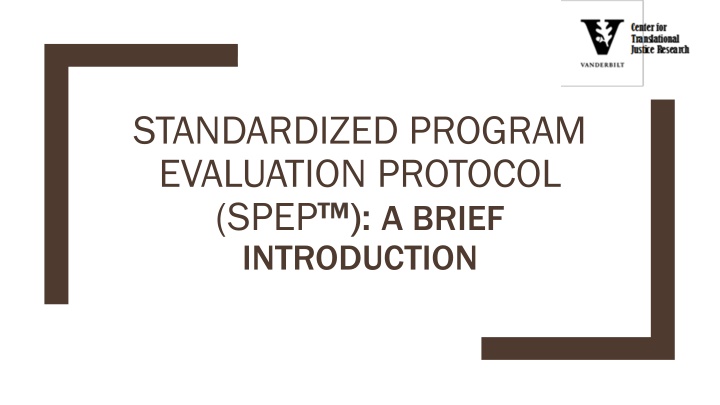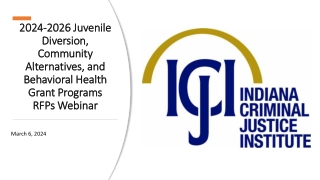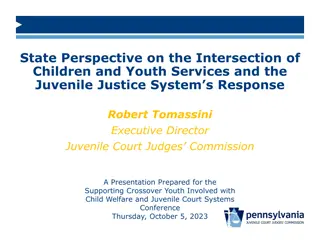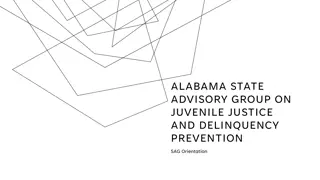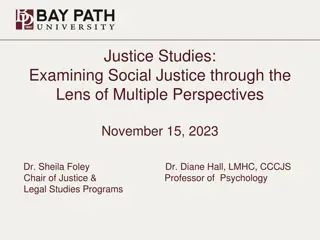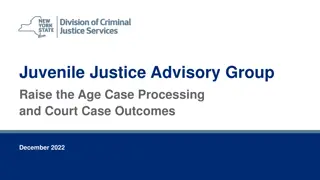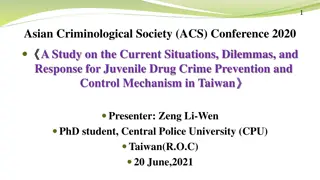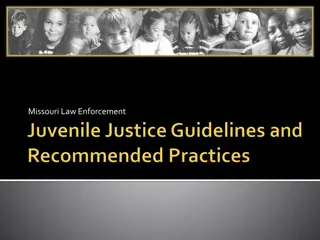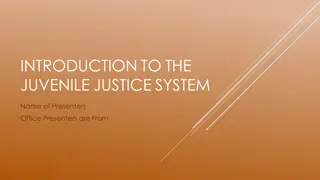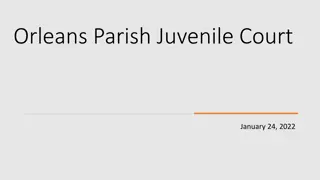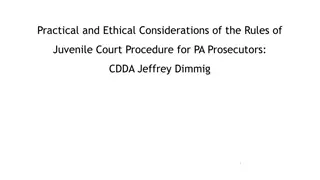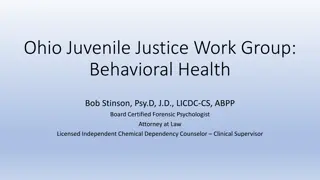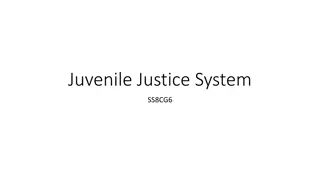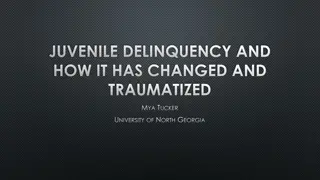Sustainable Continuous Performance Improvement in Juvenile Justice
Sustainable continuous performance improvement for juvenile justice intervention services involves utilizing evidence-based models like the Standardized Program Evaluation Protocol (SPEP) to reduce recidivism rates among justice-involved youth. Developed by Dr. Mark W. Lipsey and Dr. Gabrielle Lynn Chapman, SPEP focuses on the impact of intervention services on delinquency reduction, supported by key findings such as the importance of intervention philosophy and the effectiveness of homegrown services. Through research and meta-analysis, this approach sheds light on improving the effectiveness of juvenile justice programs.
Download Presentation

Please find below an Image/Link to download the presentation.
The content on the website is provided AS IS for your information and personal use only. It may not be sold, licensed, or shared on other websites without obtaining consent from the author.If you encounter any issues during the download, it is possible that the publisher has removed the file from their server.
You are allowed to download the files provided on this website for personal or commercial use, subject to the condition that they are used lawfully. All files are the property of their respective owners.
The content on the website is provided AS IS for your information and personal use only. It may not be sold, licensed, or shared on other websites without obtaining consent from the author.
E N D
Presentation Transcript
STANDARDIZED PROGRAM EVALUATION PROTOCOL (SPEP ): A BRIEF INTRODUCTION
Research Sustainable continuous performance improvement process for juvenile justice intervention Sustainable continuous performance improvement process for juvenile justice intervention services with the intent on recidivism reduction services with the intent on recidivism reduction Dr. Mark W. Lipsey, one of the most world s foremost scholars in program evaluation, research synthesis, juvenile delinquency intervention and field research methodology developed the SPEP evidence-based scoring model in the early 2000 s Utilizes a meta-analytic data base of over 700 experimental and quasi experimental studies of interventions with justice involved youth Focuses on intervention services ability to reduce delinquency and covers studies between 1950 2014 (currently) Worked with North Carolina and Arizona Juvenile Justice Systems to validate his model Dr. Gabrielle Lynn Chapman joined Mark in 2008 as SPEP and created the performance improvement process and training materials that complement and build off of Dr. Lipsey s SPEP moved into its 3rdU.S. state model
Lipseys research and meta-analysis support four key findings:
Key Finding #1: Intervention Philosophy Matters Howell, J.C., & Lipsey, M. W. (2012) Research-based guidelines for juvenile justice programs. Justice Research and Policy, (14) 1, p.1-18.
Key Finding #2: Comparable Impact Home grown or generic intervention services make up the majority of available services for justice involved youth Research evidence indicates that home grown services can be as effective as brand name services in terms of recidivism reduction if they are delivered well and with fidelity A serious disadvantage of homegrown/generic services is that they often do not have fidelity guidelines. Commonly, these interventions... lack the specificity that comes with the protocol for a model program and the associated training and support systems that are also often available from the developer (p. 3). Howell, J.C., & Lipsey, M. W. (2012) Research-based guidelines for juvenile justice programs. Justice Research and Policy, (14) 1, p.1-18.
Family Counseling Example Harmful Impact Positive Impact 21 homegrown 4 MST 4 FFT 29 Total Lipsey, M. W., Howell, J. C., Kelly, M. R., Chapman, G., & Carver, D. (2010) Improving the Effectiveness of Juvenile Justice Programs: A New Perspective on Evidence-Based Practice. Georgetown University, Washington, D.C., USA.
Key Finding #3: Key Components There are four factors most strongly related to recidivism reduction in intervention services for justice involved youth 1. Service Type 2. Quality 3. Dose (Quantity) 4. Risk *Strongest predictor of recidivism identified in the meta-analysis. Lipsey, M. W. (2009). The primary factors that characterize effective interventions with juvenile offenders: A meta-analytic overview. Victims and Offenders (4), 124- 147.
Key Finding #4: SPEP Ratings Are Predictive *Quality of service delivery not scored in this sample. Howell, J.C., & Lipsey, M. W. (2012) Research-based guidelines for juvenile justice programs. Justice Research and Policy, (14) 1, p.1-18.
The SPEP process Uses research-based evidence to drive changes needed for reform Not a one and done tool Continuous performance improvement process for both home grown and brand name services/programs Leverages what is currently working to support and strengthen existing best practice Designed to be used by government entities in partnership with private & nonprofit providers All while building and/or reinforcing a climate of: Partnership Partnership Education Education Transparency Transparency
What SPEP is not . . . Not designed for non-delinquent populations Not designed to be an audit tool or gotcha game The purpose of SPEP rating/scoring is to inform performance improvement NOT to grade a provider, program manager or facility Providers/Program Managers are NOT scored services (in specific locations) are rated in comparison to research evidence SPEP is NOT an effort to make all services brand name it is focused on change & optimization from within work with what you have in place
Thank you! Questions & comments? Contact information: gabrielle.chapman@vanderbilt.edu gabrielle.chapman@vanderbilt.edu Mark.Lipsey@Vanderbilt.edu Mark.Lipsey@Vanderbilt.edu
